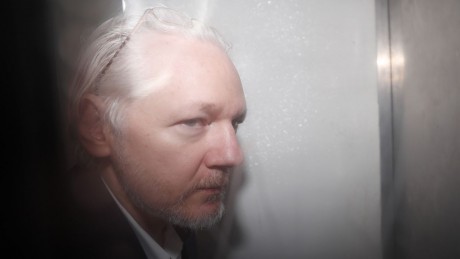Day 1 of Assange’s US extradition hearing: What you need to know
 international |
rights, freedoms and repression |
other press
international |
rights, freedoms and repression |
other press  Monday February 24, 2020 23:02
Monday February 24, 2020 23:02 by 1 of indy
by 1 of indy
The relentless campaign by the US and UK government to silence and torture Julian Assange for the so-called crime of exposing their murderous crimes in Iraq and elsewhere, continues with the first day of the extradition hearing where they plan to stitch him up and send him to the US where they will put him away for the rest of his life.
The farce is that he is being held in prison for breaking bail on another trumped up charge from almost a decade ago and which has long since been dismissed. This is purely a political show trial and a warning to real journalists to shut up and do not dare report on the crimes of the elite and powerful.
RT have been covering the lead up to the hearing and the World Socialist Website have covered a number of protests and prison visits.
Related Links: Day 1 of Assange’s US extradition hearing: What you need to know | The show trial of Julian Assange begins | ‘Every journalist should feel a cold, icy hand running down their spine’: Assange’s extradition case examined in new RT doc | Palestinian flag, Yellow Vests, Anonymous masks: Wide range of protester groups join demonstration in support of Assange | ‘History will be kind to Julian Assange, not to his corrupt accusers and Judges’ - Kim Dotcom on extradition trial | Assange’s US extradition hearing begins: What’s it all about and how did we get here? | Australian MPs visit Julian Assange at Belmarsh Prison | Assange defence team: “The empire calls it espionage. We call it journalism” | Australia: Students and workers demand release of Julian Assange and Chelsea Manning | Veteran “Four Corners” journalist Andrew Fowler denounces Australian government’s refusal to defend Assange | German politicians and cultural professionals demand release of Julian Assange
Opening arguments were made on the first day of the US extradition hearing of WikiLeaks founder Julian Assange, with the prosecution claiming his leaks risked lives while the defense argued that his case was politically motivated.
Monday’s hearing lasted six hours, including breaks, and Judge Vanessa Baraitser heard arguments from James Lewis QC, representing the US government, and Edward Fitzgerald QC, representing Assange.
The journalist’s supporters amassed outside Woolwich Crown Court, loudly chanting, holding ‘free Assange’ placards and blowing vuvuzelas. Inside the courtroom, Assange sat clean-shaven, with a new haircut and wearing glasses and a gray suit.
Speaking to the gathered media, Assange's father John Shipton condemned what he called the "ceaseless malice" directed at his son by US and UK authorities. He cited a determination by UN special rapporteur on torture Nils Melzer, who said that Assange had been subjected to prolonged “psychological torture.”
Such was the swell of support for Assange on the street that the noise from protesters could be heard from inside the courtroom. This prompted Assange himself to comment on the level of noise, saying that while he appreciated the support and understood that people “must be disgusted,” the sound was making it difficult to concentrate on proceedings.
Journalists themselves also complained on Twitter that the sound quality in the courtroom was not good, although the situation seemed to improve as the hearing went on.
‘Lives at risk’As arguments got underway, Lewis claimed for the prosecution that revelations made by WikiLeaks had put political dissidents and journalists in danger, but no names of supposed victims were offered.
Lewis said unnamed persons had “disappeared” following the leaks, but admitted there was no proof that their disappearances were linked. He also argued that journalism was not an excuse for breaking laws.
He said the case against Assange was not brought because he had disclosed "embarrassing or awkward" information about the US government, but was purely about WikiLeaks having allegedly put people at risk.
Lewis also made the case that Article 10 of the European Convention on Human Rights, guaranteeing freedom of expression, did not apply in Assange’s case.
Extradition ‘could be fatal’Defending Assange, Fitzgerald argued that the request for his extradition was politically motivated and therefore constituted a breach of Article 41 of the 2003 UK-US extradition treaty, which offers exceptions in the case of political offenses.
Fitzgerald argued that Assange would be at high risk of suicide if extradited and would be subjected to "inhuman and degrading treatment" in a US prison. The consequences of extradition could be "fatal," he said.
To bolster the argument against extradition (which could result in a life sentence for Assange), Fitzgerald referred to former US President Barack Obama's decision to commute the sentence of fellow whistleblower Chelsea Manning and a 2013 decision not to prosecute Assange, made on the grounds that the US would also need to prosecute every newspaper that reported his revelations.
A spokesperson for Obama’s Department of Justice was quoted as saying at the time that “if you are not going to prosecute journalists [at the NYT, for example] for publishing classified information, then there is no way to prosecute Assange.”
See https://www.rt.com/news/481576-assange-extradition-hearing-begins/ for the actual full report.
